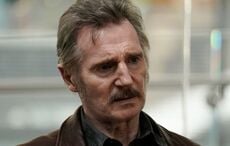According to the US National Institute of Mental Health 26.2 percent of American (aged 18 and over) suffer from a mental health disorder. Similarly in Ireland one in four people’s lives are affected by a mental health issue.
Depression is hard to combat alone. It is impossible to get better alone. If you or someone you know is suffering from depression, talk to them about it. Once the talking begins, the healing can start.
Here are some celebrities who have openly faced up to their depression.
F. Scott Fitzgerald
In a famous 1936 interview in the New York Post, the great writer revealed the depths of his depression and loss of self-confidence.
When asked his thoughts about the "jazz-mad, gin-mad" generation, he said, "Why should I bother myself about them? Haven't I enough worries of my own? You know as well as I do what has happened to them. Some became brokers and threw themselves out of windows. Others became bankers and shot themselves."
Jim Carrey
Carrey attributes a healthy diet and supplements for helping him improve his mental health. "You need to get out of bed every day and say that life is good. That's what I did, although at times it was very difficult for me," he said.
Drew Carey
"Back then I was so full of a lot of self-hate," Carey has said. "Man, I just didn't like myself."
He turned to comedy and quickly became a regular in the stand-up circuit in Cleveland. He soon got a shot on "The Tonight Show" and afterward Johnny Carson called him "funny as hell."
Carey says getting approval from such a legend helped him overcome his old feelings of unworthiness.
Rosie O’Donnell
“The dark cloud that arrived in my childhood did not leave until I was 37 and started taking medication," she said, noting how much antidepressants have improved over the years. "The gray has gone away. I am living in bright Technicolor."
Jon Hamm
“You can change your brain chemistry enough to think: 'I want to get up in the morning; I don't want to sleep until four in the afternoon," Hamm told UK magazine The Observer in September, 2010, speaking about medication.
Owen Wilson
Wilson "bounced back" from his suicide attempt, People reported eleven weeks later, by spending time with family and close friends.
Catherine Zeta-Jones
Previously, Zeta-Jones had described her bouts with depression, telling the Sunday Times in the U.K. "I'm lucky ... but that's not to say I don't get down on myself ... I don't just bring myself down, I bring everyone around me down. It's like a dark cloud, 'Uh-oh, here we go,' and I have to snap out of it."
Winona Ryder
After falling asleep with a lit cigarette and setting herself on fire, Ryder sought treatment, briefly, in a mental institution herself, and finally with a private therapist.
Zach Braff
The “Garden State” writer / director and actor said filmmaking helped him cope: "[T]o have millions of people go, 'I watched your movie and related,' was the ultimate affirmation that I'm not a freak."
Kylie Minogue
Minogue also struggled with the perception that she'd "never be normal again," she told the media in 2007. Gradually, she came to realize that after breast cancer, "[Y]ou never go back to a normal state, instead you have to create a new normal state."
Sheryl Crow
In an interview with Blender magazine, "Depression has been part of my existence for as long as I can remember. I miss things I never even had."
J.K Rowling
She credits writing her first Harry Potter novel with helping her overcome the depression.
So I guess if you get sad, just write a billion dollar franchise of novels and films. I mean that’s what I’m going to do next time I feel blue. (probably tomorrow)
Russell Brand
Went to rehab, kicked his addictions and has managed to defy critics, achieving success with stand-up comedy, gigs on MTV and blockbusters like "Forgetting Sarah Marshall.
Brad Pitt
Pitt said that, in spite of the fact that he was a full-on movie star by the late 90's, he "got really sick of [himself]" and became a pothead shut-in. He also went on to say that his depression made him feel like "the ultimate loser."




Comments